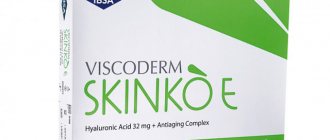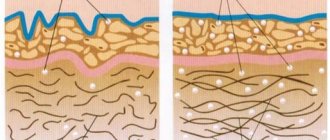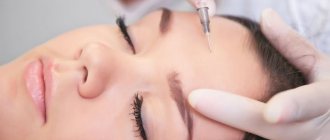Hyaluronic acid – what is it?
Hyaluronic acid is a polysaccharide that is synthesized by the body and is found in many biological fluids (for example, saliva, joint fluid). In the body of a healthy person, about 5 g of hyaluronic acid is renewed daily, the total acid content in the body fluctuates within 15 g (average value).
This is interesting! One gram of hyaluronic acid can bind and hold up to 3 thousand grams of water.
The bulk of hyaluronic acid is concentrated in the connective tissue of the skin, nerve fibers, and mucous membranes of the body. Hyaluronic acid molecules attract, accumulate and retain water molecules, creating the necessary hydration and elasticity in the tissues.
With age, the natural synthesis of hyaluronic acid in the body slows down, which clearly manifests itself in the condition of the skin - it loses turgor, becomes dry and wrinkled.
Allergy to hyaluronic acid, photo on the face
The cosmetics industry widely uses the properties of hyaluronic acid, offering external (creams, gels, correctors) and internal (injections, tablets) cosmetic preparations to restore and maintain skin condition. In medicine, hyaluronic acid is injected directly into the joint, improving the composition of its synovial fluid.
Hyaluronic acid is an immunoinert substance, safe to use, and decomposes after introduction into the human body. Currently, hyaluronic acid is not produced from animal raw materials, but is synthesized using bacteria.
Manifestations
An allergy to hyaluronic acid has the following symptoms:
- There is severe itching and burning in the area where the cream was applied or the injection was administered.
- The injection site becomes very red and swollen. Such reactions are considered normal if they occur within the first three days after the injection, but gradually their severity should decrease until the skin condition is completely normalized. If after a few days the situation does not improve and the symptoms worsen, it means that an infection has occurred or an allergic reaction is developing. Therefore, you urgently need to inform the cosmetologist who performed the procedure about this.
- Signs of allergic dermatitis appear.
Is there an allergy to hyaluronic acid?
Is there an allergy to creams or beauty injections with hyaluronic acid?
For the vast majority of people, allergies after hyaluronic acid are not typical. However, we should not forget about the possibility of an individual reaction of the body.
Allergic reaction after hyaluronic acid
Allergy symptoms may not be to the hyaluronic acid itself, but to:
- giving injections;
- for related cosmetics;
- for anesthesia;
- to poorly purified hyaluronic acid of animal origin;
- nervous reaction to a stressful procedure.
Article on the topic: What are parabens? How are they dangerous for the body?
Is there an allergy to external cosmetics? Symptoms of allergies to creams and gels applied to the face cannot be excluded.
The reason is individual intolerance to a particular substance in cosmetic products. It may not be hyaluronic acid itself that causes allergies, but fragrances, stabilizers or preservatives.
Note! If you are prone to allergies and are planning to undergo lip augmentation or skin rejuvenation with hyaluronic acid preparations for the first time, then conduct a preliminary test to determine its tolerance.
Main Treatment Options
Allergy to the use of fillers based on hyaluronic acid and other drugs requires the help of a specialist. If signs of the disease appear after using creams and other external remedies, then to eliminate the manifestations:
- Repeated skin contact with irritants should be avoided.
- It is recommended to use an antihistamine. Prescribe tablets and ointments to eliminate external signs.
- If you are concerned about severe itching and burning, and the skin turns red, then to quickly improve the situation, use corticosteroid hormonal drugs like Prednisolone, Hydrocortisone and others. These drugs cannot be taken for a long time and should only be prescribed by the attending physician after an external examination and determination of the allergen.
If an allergy to hyaluronic acid appears immediately after the injection, the following measures must be taken:
- Stop the procedure.
- Use oral, topical, or injectable. The choice of medication depends on the severity of the patient's condition. Use histamine receptor blockers or corticosteroid antiallergy medications.
- If the condition does not improve and the reaction increases rapidly, you need to call a medical team.
Every cosmetologist should have medications in his office that can be used to relieve anaphylactic shock and other serious consequences that arise in the event of individual intolerance to individual components of anti-aging cocktails.
To prevent an allergic reaction to hyaluronic acid from reoccurring, you must completely eliminate the use of fillers and creams, under the influence of which negative reactions of the body occurred, even if mild symptoms appeared. Otherwise, repeated penetration of the irritant into the blood will cause more serious systemic reactions that pose a serious danger to the body.
Symptoms of an allergy to hyaluronic acid
Allergy to hyaluronic acid according to ICD 10 is located in the “Contact dermatitis” section. Symptoms are caused by:
- swelling and redness of the skin at the injection site;
- itching;
- urticaria localized at the point of contact or throughout the body;
- itching, burning, redness when using external cosmetics at the site of application;
- bronchospasm, anaphylactic shock (extremely rare).
Allergy to hyaluronic acid during lip augmentation
The clinical picture of an allergy to hyaluronic acid often resembles a reaction to microtrauma caused by injections. Whether it is a true allergy or not can be distinguished by the following symptoms:
- Swelling caused by microtraumas disappears in 3-4 days. The allergy will “stay” at its original volume or increase.
- An allergy may be delayed in time, whereas a reaction to injury is immediate.
- A severe allergy may indicate a reaction to a foreign substance.
Note! A high-quality hyaluronic acid preparation rarely causes allergies, since it is a natural component of human metabolism.
Why does it occur
Whether you may be allergic to hyaluronic acid or not is of interest to everyone who has decided to undergo a rejuvenation procedure. It is important to remember that under the influence of this substance, negative reactions of the body sometimes occur. It's possible:
- If the patient suffers from intolerance to synthetic hyaluronic acid.
- In case of hypersensitivity to acid of animal origin. To produce the first drugs, they used cockscombs and the vitreous bodies of cows' eyes, from which it is very difficult to remove all protein compounds. This provoked allergic reactions. Modern acid is produced from wheat substrate using special bacteria. The output is a pure substance that minimizes the risk of negative reactions in the body.
- With a genetic predisposition to allergic reactions. In this case, the immune system can react to any substance that enters the body. This factor causes a sensitization reaction much more often than others.
- In case of intolerance to individual components that are included in fillers and creams with hyaluronic acid. Peptides, vitamins, esters and other components of meso-cocktails act as irritants.
Therefore, you should pay more attention to preparing for the procedure and inform your doctor about all medications taken and cases of hypersensitivity.
What to do if you have an allergic reaction?
What to do if you have an allergy? At the first symptoms of an allergy, follow the following algorithm:
- If you feel a strong burning sensation, itching, or numbness, stop the cosmetic procedure immediately.
- Take an antihistamine and apply it to your skin.
- If symptoms worsen, call an ambulance.
Note! If you come to a cosmetologist for a procedure for the first time, then before starting any manipulations, make sure you have an anti-shock first aid kit.
Ask your doctor to explain to you in detail what is there, what it is for, and how it will be used if necessary. If the cosmetologist gets off with assurances “that this has never happened before, don’t worry, everything will be fine” - get out of there. There is no guarantee that you will not be injected with a counterfeit drug in such a salon, to which you may actually be allergic.
Article on the topic: How to treat allergies in the eyes if they constantly itch?
Diagnosis of allergy to hyaluronic acid
Diagnostic tests for allergies are possible in two ways:
- blood test;
- study of skin reaction to an introduced allergen.
Quincke's edema after using hyaluronic acid
You should contact an allergist to study allergic predisposition. If you suspect an allergic reaction, your doctor will order a test. Since the tests are paid, you can choose from what the doctor offers.
Skin tests give reliable results immediately. They are carried out as prescribed by an allergist when visiting a medical clinic. institution or if an allergy is suspected immediately before a cosmetic procedure using hyaluronic fillers.
To diagnose an allergy, the patient is scratched on the inside of the forearm and a solution containing the allergen is applied. Redness, itching, burning, and rash are indicators of an allergic reaction. If the skin remains calm for 30-40 minutes, then fillers can be safely injected.
Administration of hyaluronic acid injections
Blood is drawn for allergies from a vein. This analysis is carried out in a medical facility. The body's reaction to a number of allergens is studied by detecting certain antibodies (or lack thereof).
Prevention
Preventive measures before going to cosmetology or before using a new cream at home boil down to studying the skin’s reaction to a corrective drug or cosmetic product.
If there is no allergic reaction, but you are prone to allergies, then you can take an antihistamine for a few days for prevention. The medication must be prescribed by a doctor. Usually these are long-acting agents such as Loratadine.
Reviews
Irina, 34 years old, I was afraid to enlarge my lips because I was allergic to cats. But there was already a need for this and I decided. Hyaluronic acid was administered in the clinic. Beforehand, I studied reviews about her and asked friends. Everything worked out very well. We first did tests on the hand. I'm happy with the result. I will repeat it over time.
Tsysar Elena Anatolyevna, cosmetologist A systemic allergic reaction to the introduction of hyaluronic acid has never occurred in my practice. There are isolated increased swelling and redness at the injection sites, but no more. In such cases, the patient simply needs a little more time for the recovery period.
Pozdyaev Sergey Viktorovich, cosmetologist Article on the topic: Allergies in a child: symptoms, treatment, types of skin
The secret to the safe injection of fillers with hyaluronic acid lies in the quality of the drugs used. If you purchase products from trusted companies that guarantee the purity of the products, then by definition there can be no allergies. This is proven by my many years of practice.
Diagnostics
A dermatologist or allergist will be able to determine whether it is an allergy or an infection. The patient must donate blood from a vein to determine the level of immunoglobulin E. Exceeding its permissible value indicates an allergic reaction. A blood test also helps to accurately confirm the suspected allergen.
Skin tests are also performed. A tiny amount of hyaluronic acid is injected into a small scratch on the skin. If an immediate reaction occurs, the test is considered positive. Then additional tests are done to find out which component in the drug is reacting to.











